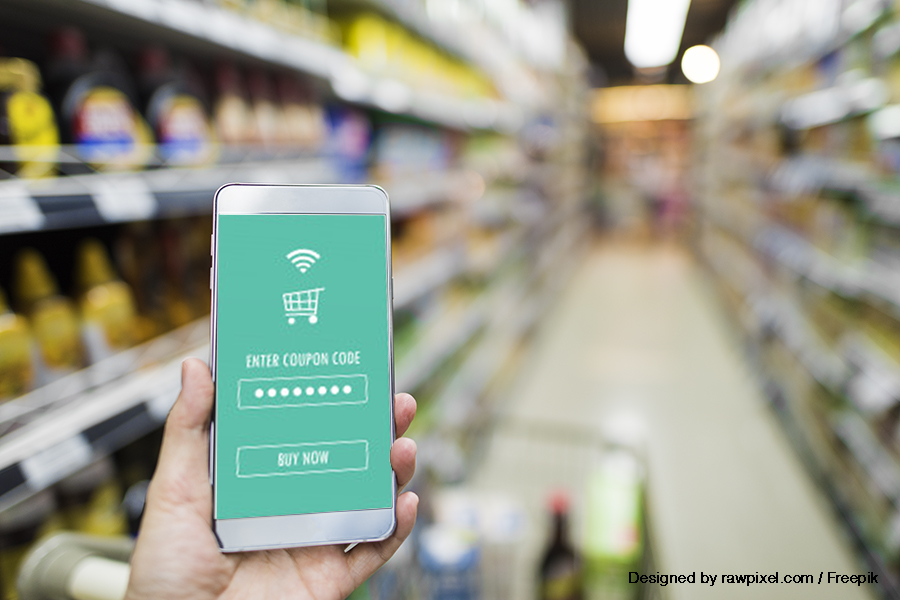
Browsing phone in supermarket
While the COVID-19 outbreak has severely impacted the retail sector, it has prompted a surge in demand for online grocery services. Coresight Research recently completed its annual online grocery consumer survey and found that for the first time, more than half of the US respondents had bought groceries online in the past 12 months, up considerably from around 37% of respondents last year.
In addition, among US online grocery shoppers, over one-third said they are buying more groceries online because of the COVID-19 outbreak. A further sizeable share started buying groceries online because of the pandemic.
Coresight Research expects a very strong uplift in US online grocery sales, with capacity rather than demand proving to be the constraint. We believe online grocery sales will approximately double during the crisis period, although the elasticity of capacity in the online grocery market is not readily quantifiable, especially given that it is rapidly expanding.
Also read: Online grocery, Ramadan and COVID-19: RedSeer
Turning focus to the UK, a more mature online grocery market, where online grocery shopping has witnessed exceptionally strong demand. In some cases, the retailers are struggling owing to such high demand. According to Coresight Research, in the UK, the mixed-mode, multichannel models and asset-light models have been able to flex much more smoothly to the surge in online grocery.
Ocado is one retailer with no such flexibility, stressed Coresight Research. Its UK online grocery operation is highly automated with centralised fulfillment centres, and the company has struggled badly amid increased demand. All UK grocery retailers have seen delivery slots snapped up rapidly, but Ocado has seen particular difficulties coping with demand. Access to its website has often been blocked except for those who already have a delivery slot booked, or website visitors have been subject to long virtual queues. The retailer has not accepted new customers since mid-March.
Multichannel retailers’ operations, on the other hand, have proved much more resilient. UK-based Tesco fulfills grocery orders from its physical stores, as well as a limited number of dark stores for online orders only. This model provides the company with some scope to flex capacity, and the crisis prompted it to add 145,000 delivery slots to take its total weekly delivery slots to 805,000. And Tesco has not restricted access to its website or removed functionality.
Similarly, Sainsbury’s grew its number of delivery slots from 370,000 to 600,000. In addition, it ramped up capacity at its nascent rapid-delivery service ChopChop, where typically smaller orders are fulfilled by third-party riders biking deliveries from nearby stores.
To offer rapid deliveries, British retailer Marks & Spencer has partnered with UberEATS and Morrisons with Deliveroo. Those collaborations reflect the advantages that labour-heavy, asset-light services have enjoyed during this crisis. Rapid-delivery services that typically rely on a courier on a bike and are often outsourced to third-party firms have proved to be the most flexible in expanding capacity.
In the US too, Instacart rapidly sought to expand as demand surged. On March 23, the company reported a 150% uplift in online grocery order volume and a 15% increase in average order size over the prior weeks. As a result, Instacart said it was seeking to double its grocery-shopping staff by hiring 300,000 more shoppers.
In grocery, the coronavirus crisis has exposed meaningful challenges for the highly automated fulfillment model, stated Coresight Research. Multichannel retailers with hybrid online/offline operations have proved much more flexible, and this is likely to bolster shopper loyalty and repeat customer, thus resulting in market-share gains in the online channel.
For all the latest retail news from Middle East, follow us on Twitter and LinkedIn, like us on Facebook and subscribe to our YouTube page.
Notifications